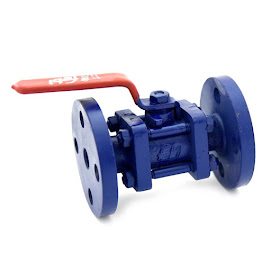Ball Valve Basics: A Complete Guide for Plumbing and Industrial Use
Introduction
Ball valves are essential components in both residential plumbing and industrial Udyog (industries). They provide efficient flow control, easy operation, and minimal leakage. This comprehensive guide covers ball valve types, materials, applications, and selection tips for plumbing and industrial systems.
What is a Ball Valve?
A ball valve is a shut-off valve that controls fluid flow using a rotatable ball with a central bore. When the bore aligns with the pipeline, the fluid flows; when rotated 90°, the flow stops. Known for simplicity and durability.
Key Benefits:
Fast shut-off (1/4-turn)
Low torque requirement
Minimal maintenance
Long operational life
Ball Valve Types
1. Full Port Ball Valve
No flow restriction
Used in critical flow applications
2. Standard (Reduced) Port Valve
Smaller internal diameter
Cost-efficient for general plumbing or Udyog use
3. V-Port Ball Valve
V-shaped ball opening for controlled flow
Ideal in precision industrial processes
4. Multi-Port Ball Valves (3-way, 4-way)
Diverts flow in multiple directions
Suitable for complex piping networks
5. Trunnion Mounted Ball Valves
Used in high-pressure Udhhyog environments
Offers additional stability to the ball
Materials Used
| Material | Properties | Best Used In |
|---|---|---|
| Stainless Steel | Corrosion resistance, strong | Industrial Udhhyog, chemical plants |
| Brass | Affordable, corrosion-resistant | Residential plumbing |
| PVC | Lightweight, chemically resistant | Agriculture, water systems |
| Carbon Steel | High strength, lower corrosion resistance | Power plants, gas lines |
Applications in Plumbing & Udhhyog
Residential Plumbing
Kitchen & bathroom water lines
Outdoor hose bibs
Gas lines
Industrial Udyog
Chemical processing
Food & beverage industries
Petrochemical & oil refineries
Power generation plants
How to Select the Right Ball Valve
Consider Fluid Type: Match valve material with fluid characteristics.
Pressure & Temperature Ratings: Verify specifications match system needs.
Valve Size & Flow Rate: Choose full or reduced port based on application.
End Connections: Select threaded, flanged, or welded as per piping system.
Automation: Consider actuated ball valves for automated Udyog setups.
Advantages of Ball Valves
Tight sealing with minimal leakage
Simple structure and easy operation
Versatile for multiple Udyog and plumbing systems
Quick shut-off capability
Durable and low-maintenance
FAQs (People Also Ask)
Q1. Are ball valves better than gate valves?
Yes. Ball valves offer quicker operation and better sealing compared to gate valves, especially in applications needing frequent switching.
Q2. Can ball valves be used in hot water lines?
Yes, especially those made of stainless steel or brass. Ensure the valve is rated for the operating temperature.
Q3. What is the life expectancy of a ball valve?
Depending on material and usage, a quality ball valve can last 8-15 years or more with proper maintenance.
Q4. Can ball valves handle high pressure?
Yes. Trunnion-mounted ball valves are specifically designed for high-pressure Udyog applications.
Q5. Are PVC ball valves suitable for drinking water?
Yes, provided they are certified as food-grade or potable water-safe.
Conclusion
Ball valves serve as indispensable flow control tools across plumbing systems and Udhhyog operations. From residential water lines to petrochemical plants, their versatility, durability, and ease of use make them a preferred choice. Select the right type, size, and material to ensure optimal system performance.
Explore verified suppliers on TradeIndia, Justdial, and local GMB listings to get started.


Comments
Post a Comment